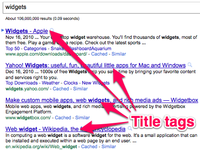Learn/9-Common-Title-Tag-Mistakes-and-How-To-Avoid-Them
By [[User:|]] on
A website's title tags are very important for several reasons:- 1) The title tag shows up in search results as the blue link, and a good one helps the site get more clicks and visitors from search results.
- 2) Title tags are a crucial SEO element that can help the website show up higher when people search for the words in it.
- 3) Title tags show up when web pages are shared on social media sites like Facebook. This is important because social media mentions are now a ranking factor in Google search results.
So if you have the time to optimize one thing on your website, title tags are it. Here are some of the top mistakes and missed opportunities I've seen in title tags. Avoid these and you'll be ahead of the game. You'll rank higher in search results and entice more people to click on your site.
9 Signs of a Bad Title Tag:
1. "Home" or "Home Page" in title tag
It may be logical or helpful to the website owner, but including "Home" or "Home Page" does not help visitors or search engines. All we really care about is what the page is about, and what it offers us. Why take up space with this non-information? You surely don't want to rank for the terms "home" or "home page."
2. Domain name in title tag
Including the domain name (like example.com) in the title tag is redundant and takes up prime SEO real estate.
If a searcher cares what site they'll be taken to, they can look at the green URL that's visible in the search result before they click. And web pages are automatically going to rank very high (at the top unless something is wrong with your SEO) when people search for your domain name, whether it's in the title tag or not.
Put another way - Is it more important to tell people your website address, or to tell them about what you offer and show search engines a keyword?
3. Too long
Search engines display only the first 70 characters (about) of a web page's title tag. The rest gets chopped off and replaced with ellipses.
4. Too short
Short and sweet can be nice, but you might as well use all the space available to tell people and search engines about the web page. Making your title tags close to - but not exceeding - 70 characters is a good way to get the most out of your title tags and optimize your chances of showing up for different keyword searches.
5. No keywords
The purpose of your title tag is to tell people and search engines what your web page is about. If it doesn't include keywords, you're doing it wrong.
6. Just the business name
I know it's tempting to make your title tags be just your business name, especially on your home page. But unless your business name is 70+ characters long or contains several of your important keywords already, you should really include more so that you'll be found - and clicked on - by people who aren't familiar with your business yet.
For example, if you were searching for a local business that sold widgets, how likely would you be to click on a search result that just said a generic business name like "Jones & Jones, Inc."? You probably wouldn't waste your time clicking on a search result that doesn't make it clear the company is in your city and or that it sells what you're looking for. Because the title tag doesn't make it clear what Jones & Jones sells, or where they're located, search engines are less likely to rank that result high in search results.
7. First few words aren't important or eye-catching
Research shows that people scan search results quickly. Searchers pay the most attention to the first few words in search results, and the first few results on the page. The heat map at right shows you where people tend to click in a page of Google search results.
Make the first few words of your title tags count by including the keywords you think will be most relevant to searchers. Or write something that will catch people's attention. Put your best foot forward, and cut the meaningless fluff.
For example, I searched for "cat toilet training" and found the search result shown below. It did catch my attention and make me read the whole search entry to see if it was really what I was looking for. But many people would just skip it, and focus on the search results that mention their search terms right up front.
8. Doesn't include geographic location - if location is important
If you have a physical retail location, or if you want to target customers in a specific region, you should make it clear to searchers and search engines where you're located. Include yourneighborhood, city, state, or county - whatever makes most sense for your business - in your title tag and in other website content.
9. Too many keywords (spammy looking)
If your title tag is just a long string of keywords, it might rank well for those keywords, but the real live people searching for those words will probably be less likely to click that result.
Here are two examples of keyword-filled title tags in a search result:




